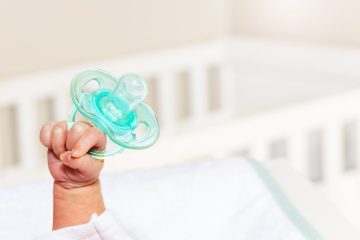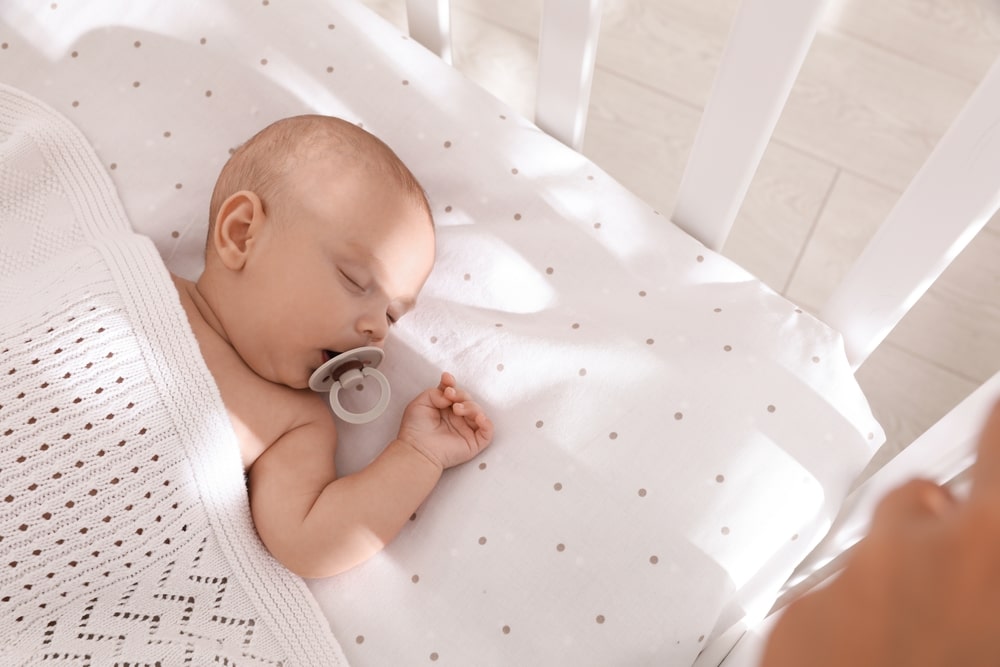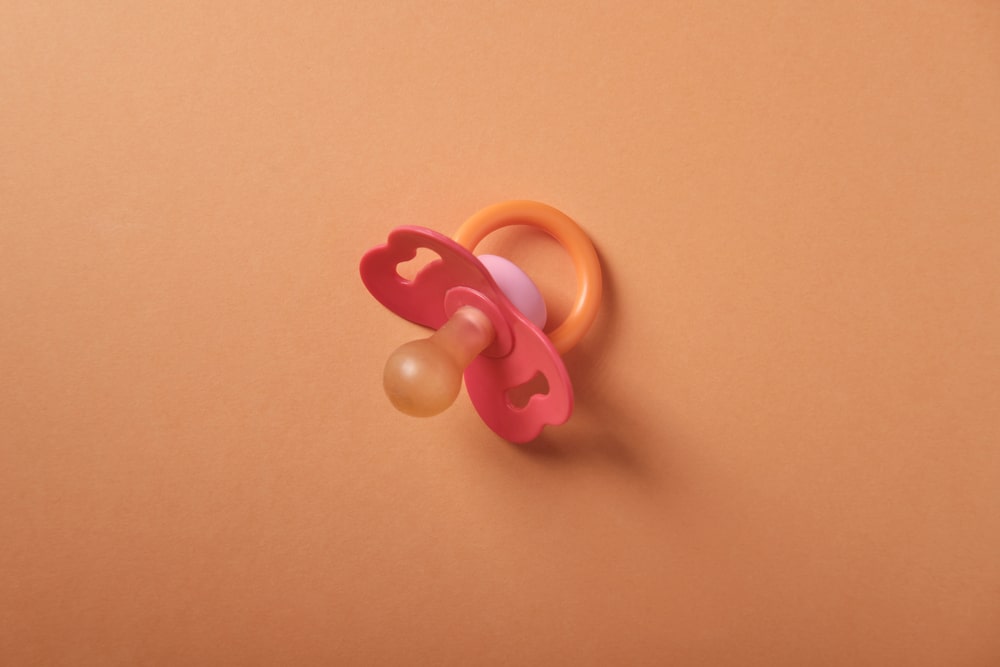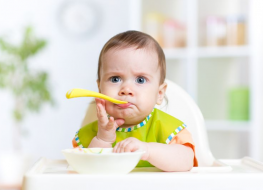
Every kid will go through a pacifier phase. Initially, pacifiers help parents prevent their kid’s thumb-sucking habit. But there’s more to a baby’s pacifier that many parents tend to overlook. So when should a baby stop using a pacifier?
This article is your ultimate guide to understanding the pros and cons of pacifier use for children, as well as recognizing the telltale signs indicating it’s time to bid farewell to their beloved binky.
The Pros of Using a Pacifier
Many parents feel a tinge of guilt when they allow their kids to use pacifiers. But before you say no to binkies, it’s only fair to know the different pros of using them. Here are some of them.
Soothing for Babies
Pacifiers are soothing for kids due to their innate sucking reflex. Most children have an instinct to suck, which is associated with feeding. Sucking on a pacifier mimics how kids feed through their bottles. This action gives them comfort and satisfaction from oral stimulation.
Moreover, pacifiers give children a sense of familiarity and security. The act of sucking can assist in establishing a comforting routine for babies, aiding in their ability to calm down during times of fussiness or agitation.
You Can Use It as a Sleep Aid
It is a standard for parents to feed their kids before they go to sleep, and this bedtime routine can signal your kids to relax and get ready to sleep. Pacifiers can help them sleep faster. Parents can also use it as a sleep aid during nap time without needing to feed their kids when unnecessary.
Furthermore, a pacifier allows your kids to self-soothe when they awake in the middle of the night. When babies learn to self-soothe, it also gives parents convenience. You don’t always need to get up and try to settle them back to sleep.
Studies show that picking up your baby when they wake at night will make it more challenging to get them back to sleep. Pediatrics recommends waiting for your kids to settle themselves down before making a move, and a pacifier use will help your kids do it.
Used for Pain Relief
At six months old, a child’s teeth will begin to emerge, and the teething phase can be painful for your kids, making them more irritable. They can chew on their pacifiers, which can give pressure to relieve the pain from their sore gums. A toddler’s pacifier can double as a teething toy for your kids.
Pacifiers are an excellent distraction for their teething pain since sucking on pacifiers can provide a calming effect. It can also be a form of distraction. The teething can last up to 12 months, and sometimes all you can do is wait for their teeth to grow to ease the pain.
Reduces the Risk of SIDS
Some studies show evidence that pacifiers can greatly reduce the risk of SIDS. Many factors cause sleep-related infant deaths, and pacifiers are just one method to prevent them. Combined with a safe infant sleeping environment, you can ensure your kid’s safety.
Here are some ways how pacifiers can help reduce SIDS.
- Pacifiers are great for airway stimulation. Pacifiers can help maintain an open airway and prevent your baby’s tongue from obstructing their throat to prevent suffocation.
- Pacifiers can help prevent kids from entering deep sleep where there is a higher risk of SIDS.
- Studies suggest that pacifiers help stimulate your kid’s central nervous system. This makes them more responsive to external stimuli and alert, potentially helping them wake up when they experience breathing difficulties.
Here are guidelines from the American Academy of Pediatrics on how you can use pacifiers to prevent SIDS.
- Offer pacifiers to your kids during bedtime or naptime, but never force them to use them if they don’t want to.
- It’s better if a pacifier stays while they sleep but don’t reinsert it when it falls out while they sleep.
- Never attach a binky to a cord or string since they could pose a strangulation hazard.
- If a baby is still breastfeeding, wait for the kids to establish a breastfeeding routine before giving them a pacifier. Typically, pacifiers can be used after the first month.

The Cons of Using a Pacifier
Doctors recommend that before your kids celebrate their first birthday, they should be out of their pacifiers. Although there are positive sides to using them, breaking the habit too late or too much usage can also have its downside. Here are some of them.
It Causes Nipple Confusion
Pacifier weaning too early can cause nipple confusion. Kids need to establish a breastfeeding routine before introducing pacifiers. It will be hard for little kids to differentiate the breast and the pacifier, leading to less feeding and latching problems which can cause nutritional concerns.
Furthermore, unsupervised use of pacifiers can interfere with your kid’s hunger cues, leading to reduced appetite. If a child spends more time sucking on their pacifier instead of drinking formula or eating solid food, it can hinder their physical development.
It Can Cause Dental Problems
Pacifiers can harm baby teeth when they continue to use them over two years old. Here are the downsides of prolonged use of pacifiers to your kid’s dental development.
- Malocclusion: Frequent and continuous sucking of the pacifier can affect the alignment of a child’s teeth and jaws. This condition refers to the improper positioning of the teeth while the jaws are closed. It can develop overbite, underbite, or crossbite, where the bottom and upper teeth don’t meet properly.
- Open bite: Open bite is a condition where the front teeth don’t meet when a child bites down. This condition can affect chewing, speech, and facial aesthetics.
- Narrow palate: Overuse of pacifiers can affect the shape and development of a baby’s palate. It can narrow the palate that impacts the dental arch causing the teeth to crowd.
Remember that this condition depends on how frequently and long a child uses a pacifier. The earlier you cut the habit, the less likely they are to develop these dental conditions. You can also consult a pediatric dentist for proper use of pacifiers.
Ear Infections
Doctors have linked the frequent use of pacifiers to a high risk of ear infections. Although there are many factors that a child can have an ear infection, using a pacifier could increase the risk of getting them. Here are the reasons why:
- When infants suck on pacifiers, it creates a negative pressure in the middle ear that draws the fluid from the throat back to the ear. The fluid can increase the risk of bacteria buildup that can cause middle ear infections.
- Pacifiers can be a breeding place for bacteria, especially if they are shared among babies and not cleaned properly.
It’s also important to note that not all kids develop ear infections by using a pacifier. Other factors lead to infections, such as age, ear infection history, and secondhand smoke exposure.
Dependency
Although pacifiers are great for soothing babies, their use of them can develop a dependency on their emotional regulation. This dependency may transfer to other comfort items, such as thumb-sucking or reliance on transitional objects. Here are some practices you do to ease your child’s dependency on their pacifier.
- As they grow older, limit the use of their pacifier. As much as possible, only give it during bedtime or nap time.
- Give your kids alternative ways of comfort by giving them new toys such as stuffed animals or a soft blanket.
- Reward your kids when they don’t use their pacifier at the times they usually do. You can make them a progress chart or offer small treats to encourage them.
When Should Babies Stop Using a Pacifier? Here Are 6 Signs
Many parents are still confused about when to stop giving baby pacifiers to their little ones. Here are some observable signs to see if kids are ready to say goodbye to binky.
- You can start weaning off pacifiers as early as six months old. Ideally, when children reach the age of 2, they should be entirely off their binkies.
- If your kids already have a full set of teeth, taking off their pacifier use is best. This practice prevents misalignment of their permanent teeth.
- Prolonged use of a paci can interfere with speech. If you notice any speech delays in your kids, it is time to take their pacifiers.
- If your child’s pacifier use interferes with their appetite or eating habits, consider stopping it. Prolonged pacifier use can reduce interest in solid foods or decrease sucking ability during feedings.
- If your child is becoming more socially aware and using a pacifier interferes with their ability to communicate or engage with others, it may be a sign that they are ready to stop using it.
- If your child wakes frequently throughout the night because the pacifier has fallen out and they cannot fall back asleep, it might be a good time to wean off the pacifier. This can help promote better sleep hygiene.

Key Takeaway
It’s safe to say that all kids will use a pacifier at some point in their growing-up years, and it is perfectly normal for them to do so. As parents, it is your responsibility to ensure that the use of the pacifier is to their advantage. We hope the pros, cons, and signs when babies stop using pacifiers helps with your parenting.
Don’t forget to subscribe to our blogs for more parenting tips. Also, Ashtonbee offers a wide range of high-quality baby products. Get your baby essentials and shop with us today!



